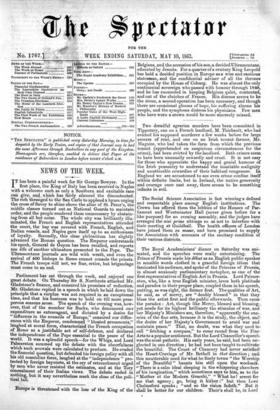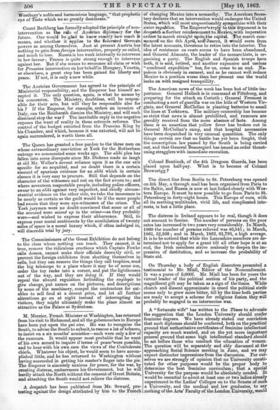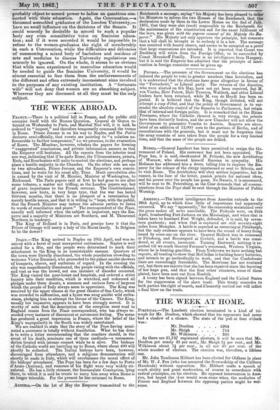NEWS OF THE WEEK.
IT has been a painful week for Sir George Bowyer. In the I first place, the King of Italy has been received in Naples with a welcome such as only a Southern and excitable race can give, and which has fairly silenced the discontented. The rich thronged to the San Carlo to applaud a hymn urging the cross of Savoy to shine above the altar of St. Peter's, the middle classes turned out as National Guards to maintain order, and the people rendered them unnecessary by abstain- ing from all but noise. The whole city was brilliantly illu- minated, the French and English representatives attended the court, the bay was covered with French, English, and Italian vessels, and Naples gave itself up to au enthusiasm of loyalty. Secondly, this clear plebiscitum has slightly advanced the Roman question. The Emperor understands his epoch, General de Goyon has been recalled, and reports are rife of another ultimatum presented to the Pope. The Ultramontane journals are wild with wrath, and even the arrival of 400 bishops in Rome cannot console the priests. The French troops will not, we fear, retire, but brigandage must come to an end.
Parliament has sat through the week, and .enjoyed one great debate. On Thursday Sir S. Northcote attacked Mr. Gladstone's finance, and censured his promises of reduction. Mr. Gladstone replied in a speech in which he laid down the principle that a surplus was not required in an exceptional time, and that his business was to hold on till more pros- perous seasons arose. The speech of the evening was, how- ever, that of the member for Bucks, who denounced our expenditure as extravagant, and dictated by a desire for "influence in the councils of Europe," censured our differ- ences with the Emperor, condemned " bloated armaments," laughed at moral force, characterized the French occupation of Rome as a justifiable act of self-defence, and declared the independence of the Pope essential to the peace of the world. It was a splendid speech—for the Whigs, and Lord Palmerston summed up the debate with the cheerfulness which such avowals were calculated to produce. He evaded the financial question, but defended his foreign policy with all his old masculine force, laughed at the "independence " pro- tected by foreign bayonets, at the cry of retrenchment urged by men who never resisted the estimates, and at the Tory concealment of their Italian views. The debate ended in nothing, but it may nevertheless mark the close of the poli- tical lull.
Europe is threatened with the loss of the King of the Belgians, and the accession of his son, a decided Ultramontane, educated by Jesuits. For a quarter of a century King Leopold has held a decided position in Europe as a wise and cautious statesman, and the confidential adviser of all the thrones occupied by the House of Coburg. He was almost the only continental sovereign who passed with honour through 1848, and he has succeeded in keeping Belgium quiet, contented, and out of the clutches of France. His disease seems to be the stone, a second operation has been necessary, and though there are occasional gleams of hope, his suffering alarms his people, and the symptoms distress his physicians. Few men who have worn a crown would be more sincerely missed.
Two dreadful agrarian murders have been committed in Tipperary, one on a French landlord, M. Thiebault, who had evicted his supposed murderer a few weeks before for large arrears of rent, and one on an Irish tenant farmer, Mr. Maguire, who had taken the farm from which the previous tenant (apprehended on suspicious circumstances for the crime), had been evicted by the landlord. Both crimes seem to have been unusually cowardly and cruel. It is not easy for those who appreciate the happy and genial humour of the Irish peasantry to understand the insatiable malignity and unutterable cowardice of their habitual vengeance. In England we are accustomed to see even crime confine itself within definite limits, but in Ireland, the native generosity and courage once cast away, there seems to be something infinite in evil.
The Social Science Association is fast winning a defined and respectable place among. English institutions. The Crown has offered them the lobbies of the Houses of Par- liament and Westminster Hall (never given before for a like purpose) for an evening assembly, and the judges have arranged the nisi prius sittings so as not to interfere with their meeting at Guildhall. The health officers of London have joined them en mane, and have promised to supply the Association with accounts of the sanitary condition of their various districts.
The Royal Academicians' dinner on Saturday was ani- mated, and the speeches were really entertaining. The Prince of Prussia made his debut as an English public speaker in sensible words clothed in a graceful foreign idiom that fascinated his audience, and spoke of the Princess of Prussia, in almost anxiously parliamentary metaphor, as one of the first representatives of English Art in Prussia. Lord Palmer- ston, who, like a true English minister, loves both platitude and paradox in their proper place, coupled them in his speech, putting, as was right, the former first. The qualities of Art,. he said, as of mercy, are " doubly blessed " in that they bless the artist first and the public afterwards. Then came the paradox : Art, though like Mercy, blessed and blessing,. yet needs for its highest brilliancy the stimulus of war, and her Majesty's Ministers are, therefore, " apparently the ene- mies of the fine arts, because it is the study, the object, and the desire of her Majesty's Government to avoid war and maintain peace." That, no doubt, was what they used tc. call " fetching a compass," to come round from the Fine - Arts to a popular sentiment. But the Lord Chancellor's speech. was the most pathetic. His early years, he said, had been ne- glected in one direction ; he had not been taught to cultivate- the beautiful. The Court of Chancery had never satisfied' the Heart.Cravings of Mr. Bethell in that direction ; and: this unutterable need for what he finely terms " the Worship of the Beautiful " haunts him still upon the woolsack. " There is a calm ideal sleeping in the whispering chambers of his imagination," which sometimes says to him, as to the " Mother of the Modern Gracchi," " What ho ! arrest for me that agency ; go, bring it hither :" but then Lord Chelmsford speaks ; "and so the vision fadeth." But it shall be better for our children. Their's shall be, in Lord lArestbury's noble and harmonious language, " that prophetic eye of Taste which we so greatly desiderate."
Count Rechberg has formallyadopted the principle of non- intervention as the rule of Austrian diplomacy for the future. One would be glad to kaow exactly,how much it means, and whether it applies to the federated German powers as among themselves. Just at present Austria has nothing to gain from foreign intervention, properly so called, and much to lose. Russia is too weak internally to intervene in her favour ; France is quite strong enough to intervene against her. But if she means to renounce all claim or wish for Prussian intervention on her behalf in Hungary, Venetia, or elsewhere, a great step has been gained for liberty and peace. If not, it is only a new while.
The Austrian Government has agreed to the principle of Ministerial responsibility, and the Emperor has himself ac- cepted it. The only question, again, is what he means by his concession. The Ministry, doubtless, will be respon- sible for their acts, but will they be responsible also for his ? If the Emperor, for example, orders an invasion of Italy, can the Reichsrath dismiss the Ministry, and will such dismissal stop the war ? The inevitable reply in the negative exposes the want of reality in these octroyes reforms. The control of the budget extorted from the Prussian King by his Chamber, and which, because it was extorted, will not be again surrendered, is worth them all.
The Queen has granted a free pardon to the three men on whose extraordinary conviction at York for the Rotherham outrage we commented some weeks ago. The alibi plea has fallen into some disrepute since Mr. Dickens made us laugh at old Mr. Weller's devout reliance upon it as the one safe specific for an acquittal, and no doubt there is a certain amount of spurious evidence for an alibi which in certain classes it is very easy to procure. Still that depends on the character of the witnesses and not on the fact sworn to ; and where seventeen respectable people, including police dicers, swear to an alibi against very imperfect, and chiefly circum- stantial evidence on the other side, we take the innocence to be nearly as certain as the guilt would be if the same people had sworn that they were eye-witnesses of the crime. The York jurymen were no doubt.convinced that some or all of the accused were mixed up in the crime—as they probably were—and wished to express their abhorrence. Still, to express your moral sentiments by the annihilation of twenty miles of space is a moral luxury which, if often indulged in, will discredit trial by jury.
The Commissioners of the Great Exhibition do not belong to the class whom nothing can teach. They cannot, it is true, remove the ridiculous erections which Captain Fowke calls domes, cannot make their officials decently civil, or prevent the foreign exhibitors from shutting themselves in cells, but they can remove the things they call trophies, send the big telescope to a place where it may be of some use, order the toy racks into a corner, and put the lighthouses out of the way, and they are doing it. If they would repeal the absurd regulation forbidding the employes to give change, put names on the pictures, and descriptions by some of the machinery, compel the contractors for eat- ables to sell food at a decent price, and let all further alterations go on at night instead of interrupting the visitors, they might ultimately make the place almost as attractive as the Palace at Sydenham.
M. Mercier, French Minister at Waabington,iiaa returned from his visit to Richmond, and all the gobemouches in Europe have been put upon the qui vine. He was to recognise the South, to advise the South to submit,to rescue a lot of tobacco, to insist on a six months' armistice—such were only a few of the rumours. It would appear most probable that he went of his own accord to inquire if terms of peaceswere possible, and to hear with his own ears the views of the Confederate chiefs. Whatever his object, he would seem to have accom- plished little, and he has returned to Washington without having succeeded in getting his master's finger into the pie. The Emperor is sincerely anxious for peace, for the war, by creating distress, embarrasses his Government, but he will hardly attack the North without the consent of Great Britain, and attacking the South would not relieve the distress.
A despatch has been published from Mr. Seward, pro- testing against the design attributed by him to the French' of changing Mexico into a monardhy. The American Secre- tary declares that an intervention would endanger the United States, which will most unquestionably sympathize with their sister republics. The Emperorls reply to this argument is to despatch a further reinforcement to Mexico, with imperative orders to march straight .upon the capital. The march com- menced on the 6th April, and'harez, it would seem from the latest accounts, threatens to retire into the interior. The idea of resistance en route seems to have been abandoned, and General Almonte, the leader of the monarchists, is or- ganizing a party. The English and Spanish troops have both, it is said, retired, and another expensive and useless " combined expedition" has, for us, come to an end. Na- poleon is obviously in earnest, and as he cannot well reduce Mexico to a position worse than her present one the world looks on with resigned tranquillity.
The American news of the week has been but of little im- portance. General Halleck is in command at Pittsburg, and preparing for the attack on Corinth ; General Fremont is conducting a sort of guerilla war on the hills of Western Vir- ginia, and General McClellan is planting batteries to assail the lines at Yorktown. The military censorship has become so strict that news is almost prohibited, and rumours are greedily received from the mere absence of facts. Among them is an assertion that yellow fever has broken out in General McClellan's camp, and that hospital necessaries have been despatched in very unusual quantities. The only things certain are that no battle has yet been fought, that the conscription law passed by the South is being carried out, and that General Beauregard has issued an order threat- ening stragglers with immediate execution.
Colonel Bentinck, of the 4th Dragoon Guards, has been placed upon half-pay. What is to become of Colonel 13, rownrigg ?
The direct line from Berlin to St. Petersburg was opened on 5th May, a through mail has been organised from Paris to the Baltic, and Russia is now at last linked closely with Wes- tern Europe. It must be now possible to go from Paris to St. Petersburg in forty-eight hours. This Europe of ours, with all its seething multitudes, vivid life, and complicated inte- rests, is but a little place.
The distress in Ireland appears to be real, though it does not amount to famine. The number of persons on the poor rates has increased in two years very considerably. In March, 1860 the number of persons relieved was 46,541; in March, 1861, 52,103 ; and in March, 1862, 61,791, a high average. It is to be noticed that while the Lancashire members are de- termined not to apply for a grant till all other hope is at an end, the Irish members strive zealously to deepen the im- pression of destitution, and so increase the probability of State aid.
On Thursday a body of English dissenters presented a testimonial to Mr. Miall, Editor of the Nonconformist. It was a purse of 5,0001. Mr. Miall has been for years the virtual leader of the political section of his party, and the magnificent gift may be taken as a sign of the times. While church and dissent approximate in creed the political strife seems only to grow more bitter, till by the time both parties are ready to accept a scheme for religious fusion they will probably be engaged in an internecine war.
A "fortunate wife" has written to the Times to advocate the suggestion that the London University should confer feminine degrees. We have already stated our conviction that such diplomas should be conferred, both on the practical ground that authoritative certificates of feminine intellectual capacity are much wanted, and on the yet more important general ground that some high intellectual standard should be set before those who conduct the education of women. The question will be separately and ably discussed at the approaching Social Science meeting in June, and we may expect distincter impressions from the discussion. For our- selves we are strongly of opinion that no University consti- tuted for other purposes would be the proper body to determine the best feminine curriculum ; that a special University for the purpose would be absolutely needed. It would be essential to admit at least one or two ladies already experienced in the Ladies' Colleges on to the Senate of such a University, and the medical and law graduates, to say nothing of the Arts' Faculty of the London :University, would probably object to accord power to ladies on questions con- nected with their education. Again, the Convocation,—a thousand assembled graduates of the London University,— have no small influence on the decisions of the Senate. It could scarcely be desirable to accord to such a popular body any even consultative voice on feminine educa- tion; and if it were accorded it would be impossible to refuse to the women-graduates the right of membership in such a Convocation, while the difficulties and delicacies of summoning a mixed body of bachelors and maidens of arts and medicine to discuss University regulations can scarcely be ignored. On the whole, it seems to us obvious that while men experienced in masculine education would be needed to guide the feminine University, it would be almost essential to free them from the embarrassments of the different and often extremely inconsistent aims involved in the purposes of any existing institution. A " fortunate wife" will not deny that women are an absorbing subject. Wherever they are discussed at all they must be the may subject.
































